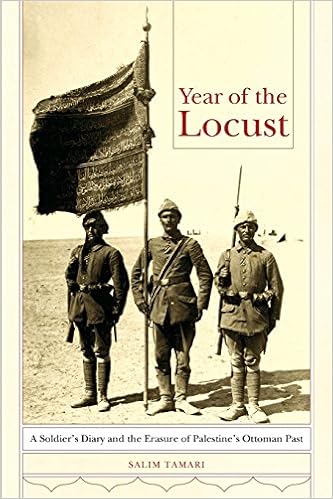
Year of the Locust captures in page-turning detail the end of the Ottoman world and a pivotal moment in Palestinian history. In the diaries of Ihsan Hasan al-Turjman (1893–1917), the first ordinary recruit to describe World War I from the Arab side, we follow the misadventures of an Ottoman soldier stationed in Jerusalem. There he occupied himself by dreaming about his future and using family connections to avoid being sent to the Suez. His diaries draw a unique picture of daily life in the besieged city, bringing into sharp focus its communitarian alleys and obliterated neighborhoods, the ongoing political debates, and, most vividly, the voices from its streets—soldiers, peddlers, prostitutes, and vagabonds. Salim Tamari’s indispensable introduction places the diary in its local, regional, and imperial contexts while deftly revising conventional wisdom on the disintegration of the Ottoman Empire.
First, it's not really a soldier's diary. It's the social-historical analysis of (very) short selections form one soldier by a scoiologist, mingled with the diaries and life events of two other (unrelated) Ottoman soldiers. It's confusing at times, and for a short book, it feels meandering and lacking incisive direction (this may reflect the translation and different criteria for social science writing).
That being said, parts are quite interesting, and opens windows on the last decade of Ottoman society. We learn about CUP (Young Turks), the educational and military society of the Ottomans, inter-ethnic cooperation and tensions, and a couple of curious interludes (Turkish officers sent to Siberia make ther way back to the ME via Mongolia, China, and central Asia, an epic story for which there are, sadly, few details). Also we get a peek into the embryonic Arab nationalist salons that were forming at the time. Also, we are shown surprising elements that explain later stuff, like that there was really no "Palestinian" nationalism in the first 3 decades of the 20th Century, that Arabs of the Palestinian Mandate looking for self-determination were aiming for either a co-dominion with Egypt or being part of a "Greater Syria," which explains why there was no effort to form the Arab state envisioned in the 1947 partition - it had no advocates on the Arab side.
No comments:
Post a Comment